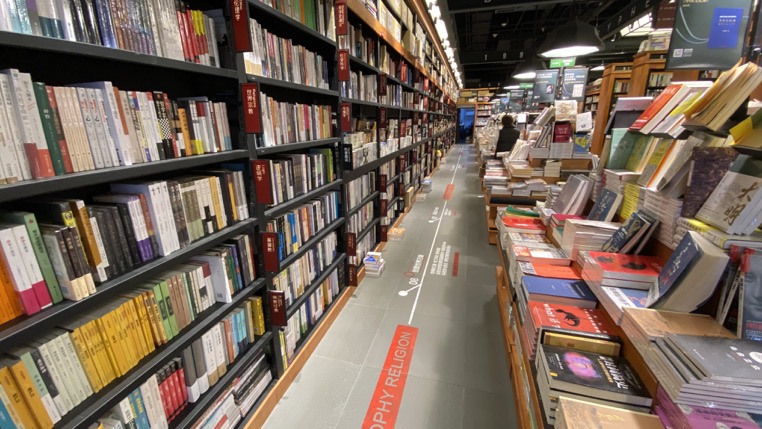03:03

In Shanghai, the imminent closure of a popular used bookstore has led to opposition and grief online, as the local government aims to renovate the old neighborhood. For more than 20 years, the bookshop - named Fudan Used Bookstore - has served avid readers near a university, with a collection that includes rare items.
Its owner Zhang Qiang, who started as a book vendor in Shanghai, has dedicated more than two decades of his life to the book trading business. And he has been given half a year to move to another location.

Fudan Used Bookstore faces closure in half a year's time. /CGTN
Fudan Used Bookstore faces closure in half a year's time. /CGTN
"I don't think I'll have the energy to spend another 10 or 20 years in building another cultural corner like this. If this bookstore has to be closed, I'm afraid that will be the end of it," said Zhang.
The bookstore's frequenters include college students and some bibliophiles, many of whom are concerned about the future of the place, which has become a fixture near Fudan University.
The owner showed us a collection of Victor Hugo books. Touching them fondly, Zhang said "it's easy to find these old and precious books in my store, which is nearly impossible in new bookstores now."
"Book selling alone is not that profitable"
It's speculated that sales of physical books would be severely affected as e-books and online bookstores gain more traction in China and beyond.

A second-hand bookstore. /VCG
A second-hand bookstore. /VCG
However, a report released in 2017 about China's book trading industry shows that the market value of physical books stood at 180 billion yuan (about $28 billion), while that of e-books was worth only two billion yuan.
Brick-and-mortar bookstores witnessed continued growth in the past few years, quite in contrast to what was expected when e-books were introduced to the market. The latest available statistics, according to China's Brick-and-mortar Bookstore Industry Report (2019-2020), demonstrate that China had over 70,000 physical bookstores in 2019, including 4,000 newly opened ones. In comparison, the number of bookstores closed in the same year was about 500.
The advent of the Kindle in 2007 was considered a historic moment in e-book development. And China became Kindle's largest market in 2016. Chinese retail and telecoms giants, including JD.com and Tencent, all jumped on the bandwagon.
"Chinese people didn't grow used to reading devices like Kindle. In regards to reading on mobile phones, they've become more aware of the hazardous effects on their health ... In addition, the use of electronic reading devices is limited among some institutions like universities. Some book publishers haven't granted e-books the rights to publish their books," said Professor Liu Chunsheng from Central University of Finance and Economics.
Home appliances retail giant Suning started to test the waters of the book trading business in 2019, by blending the sales of physical books with its electric home appliances in one of its chain stores in Shanghai.
By selling books in a home appliances store, people tend to stay longer in the shop, hence increasing the sales of other products, according to Li Yan, deputy manager of Suning Wujiaochang Store.
"Books draw more customers, which can boost the traffic in our shopping mall and help with the sales of home appliances and other electronic products ... book selling alone is not that profitable," said Li.
This is part of the reason why a new breed of sleekly designed bookstores - which provide coffee, films and other forms of entertainment - are burgeoning in China. Further, some have become selfie-worthy hot spots, one notable case being the Sanlian Seaside Library located in Qinhuangdao, north China's Hebei Province.
Professor Liu told CGTN that more high-end entertainment elements will be injected into the book trading industry and it has already become a trend.
"I don't think we can arbitrarily say if it's good or not. Since it has become a trend, it must be able to meet the demands of most people and the market. Brick-and-mortar bookstores must fit into the market's needs if they want to survive," added Liu.

